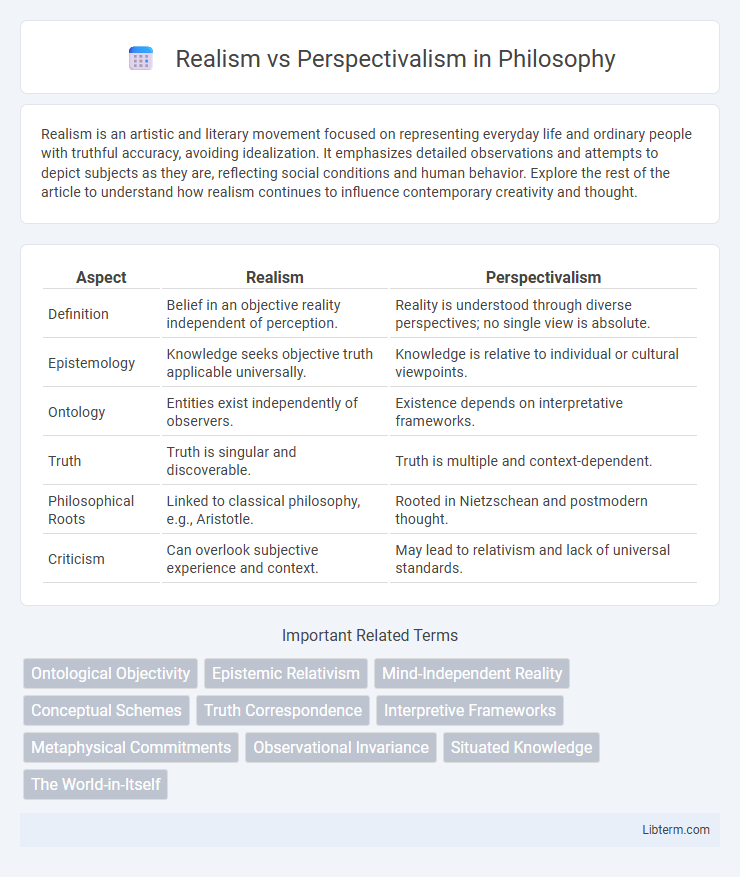Realism is an artistic and literary movement focused on representing everyday life and ordinary people with truthful accuracy, avoiding idealization. It emphasizes detailed observations and attempts to depict subjects as they are, reflecting social conditions and human behavior. Explore the rest of the article to understand how realism continues to influence contemporary creativity and thought.
Table of Comparison
| Aspect | Realism | Perspectivalism |
|---|---|---|
| Definition | Belief in an objective reality independent of perception. | Reality is understood through diverse perspectives; no single view is absolute. |
| Epistemology | Knowledge seeks objective truth applicable universally. | Knowledge is relative to individual or cultural viewpoints. |
| Ontology | Entities exist independently of observers. | Existence depends on interpretative frameworks. |
| Truth | Truth is singular and discoverable. | Truth is multiple and context-dependent. |
| Philosophical Roots | Linked to classical philosophy, e.g., Aristotle. | Rooted in Nietzschean and postmodern thought. |
| Criticism | Can overlook subjective experience and context. | May lead to relativism and lack of universal standards. |
Understanding Realism: Core Principles
Realism asserts that an objective reality exists independently of human perceptions or beliefs, emphasizing the existence of mind-independent entities and facts. It maintains that truth corresponds to how accurately statements or beliefs represent this external world, advocating for a correspondence theory of truth. Central principles include the commitment to metaphysical independence, epistemic access via observation or scientific inquiry, and the rejection of relativism in favor of universal truths.
Defining Perspectivalism: An Overview
Perspectivalism asserts that truth and knowledge depend on particular perspectives shaped by cognitive frameworks, historical contexts, and cultural backgrounds, contrasting with Realism's claim of objective, observer-independent truth. This philosophical stance highlights how different perspectives yield diverse, yet equally valid, understandings of reality, emphasizing the relational and interpretive nature of knowledge. Key proponents include thinkers like Wilfrid Sellars and Michael Friedman, who argue that epistemic access to the world is always mediated through conceptual schemes.
Historical Development of Realism and Perspectivalism
Realism emerged prominently in the early 20th century, emphasizing objective reality independent of human perceptions, influenced by scientific advancements and philosophical analysis from figures like Bertrand Russell and G.E. Moore. Perspectivalism evolved later as a response, rooted in Nietzschean philosophy, asserting that all knowledge is interpreted through subjective perspectives shaped by individual contexts and power relations. The historical development of these theories reflects a shift from the quest for absolute truths toward understanding knowledge as contingent and perspectival, impacting debates in epistemology and metaphysics.
Key Differences Between Realism and Perspectivalism
Realism asserts that reality exists independently of human perception, emphasizing an objective truth accessible through observation and reason. Perspectivalism, in contrast, holds that knowledge and truth are always interpreted through particular perspectives, influenced by cultural, historical, or subjective contexts. The key difference lies in realism's commitment to an absolute truth, whereas perspectivalism embraces a plurality of viewpoints shaping understanding.
Major Proponents and Philosophical Context
Realism, championed by philosophers such as Aristotle and Hilary Putnam, asserts that an objective reality exists independently of human perception, grounding its arguments in metaphysics and epistemology to defend the existence of mind-independent truths. Perspectivalism, advanced by thinkers like Friedrich Nietzsche and Michael Dummett, emphasizes the contextual and interpretative nature of knowledge, suggesting that understanding is always situated within particular perspectives influenced by historical and cultural conditions. The philosophical context of this debate involves contrasting ontological commitments and epistemic frameworks, where realism defends universal truths, while perspectivalism highlights the variability and contingency of human experience and cognition.
Realism in Science and Epistemology
Realism in science asserts that the entities and structures described by scientific theories exist independently of human perception or knowledge. This position holds that scientific theories progressively approximate objective truths about the external world, allowing for reliable predictions and explanations. Epistemologically, realism supports the idea that our scientific knowledge, though fallible, can genuinely represent reality rather than merely reflecting subjective perspectives or social constructs.
Perspectivalism and the Subjectivity of Knowledge
Perspectivalism asserts that knowledge is inherently shaped by the unique perspectives and contexts of observers, emphasizing the subjectivity and variability in understanding reality. Unlike Realism, which posits an objective world independent of human experience, Perspectivalism highlights that all claims to knowledge are influenced by cultural, historical, and individual viewpoints. This approach underlines the importance of acknowledging multiple perspectives to gain a more comprehensive and nuanced understanding of truth.
Critiques and Limitations of Realism
Realism faces critiques for assuming an objective reality independent of observation, which neglects the influence of human cognition and cultural frameworks on knowledge. Critics argue that Realism's insistence on a singular, observer-independent truth overlooks the complexities of perspectival interpretation and the contingency of scientific theories. Its limitations include difficulties addressing phenomena where observation shapes reality, as demonstrated in quantum mechanics and social sciences.
Challenges and Responses to Perspectivalism
Challenges to perspectivalism often center on its apparent relativism and the problem of reconciling multiple, sometimes conflicting perspectives without succumbing to skepticism. Critics argue that perspectivalism struggles to provide a stable, objective grounding for knowledge claims, potentially undermining scientific realism. In response, proponents emphasize the pragmatic integration of diverse viewpoints through coherence and intersubjective agreement mechanisms, arguing that perspectivalism enriches understanding without abandoning the pursuit of objective truth.
Contemporary Debates: Realism vs Perspectivalism
Contemporary debates between Realism and Perspectivalism center on the nature of truth and knowledge, with Realism asserting an objective reality independent of human perspectives, while Perspectivalism emphasizes that truth is always situated within particular viewpoints. Realists argue for a stable, mind-independent world that scientific theories aim to describe accurately, whereas Perspectivalists contend that all knowledge is mediated through specific conceptual frameworks and contexts, making objectivity a matter of perspective plurality rather than absolute correspondence. This ongoing discourse shapes epistemology and metaphysics by challenging assumptions about objectivity, representation, and the limits of human cognition in understanding reality.
Realism Infographic

 libterm.com
libterm.com